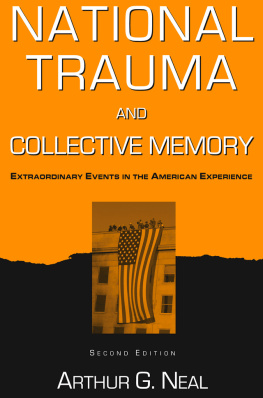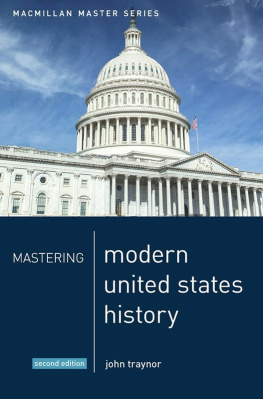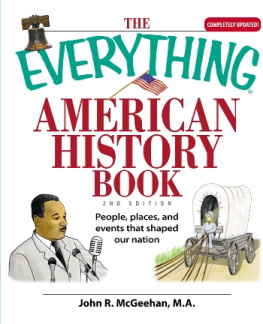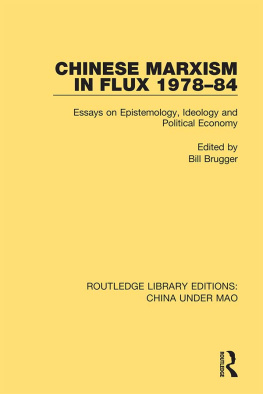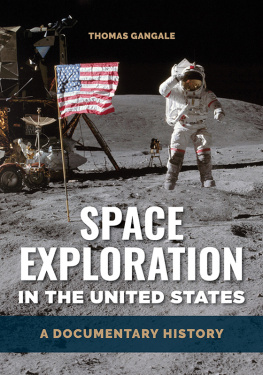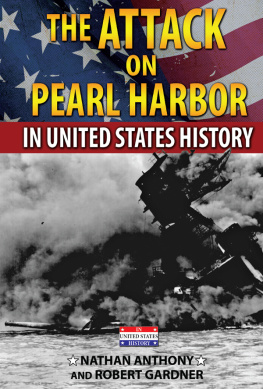NATIONAL TRAUMA
AND
COLLECTIVE MEMORY
National Trauma and Collective Memory
EXTRAORDINARY EVENTS IN THE AMERICAN EXPERIENCE
SECOND EDITION
ARTHUR G. NEAL
First published 2005 by M.E. Sharpe
Published 2017 by Routledge
2 Park Square, Milton Park, Abingdon, Oxon OX14 4RN
711 Third Avenue, New York, NY 10017, USA
Routledge is an imprint of the Taylor & Francis Group, an informa business
Copyright 2005 Taylor & Francis.
No part of this book may be reprinted or reproduced or utilised in any form or by any electronic, mechanical, or other means, now known or hereafter invented, including photocopying and recording, or in any information storage or retrieval system, without permission in writing from the publishers.
Notices
No responsibility is assumed by the publisher for any injury and/or damage to persons or property as a matter of products liability, negligence or otherwise, or from any use of operation of any methods, products, instructions or ideas contained in the material herein.
Practitioners and researchers must always rely on their own experience and knowledge in evaluating and using any information, methods, compounds, or experiments described herein. In using such information or methods they should be mindful of their own safety and the safety of others, including parties for whom they have a professional responsibility.
Product or corporate names may be trademarks or registered trademarks, and are used only for identification and explanation without intent to infringe.
Library of Congress Cataloging-in-Publication Data
Neal, Arthur G.
National trauma and collective memory: extraordinary events in the American experience /
Arthur G. Neal.2nd ed.
p. cm.
Includes bibliographical references and index.
ISBN 0-7656-1581-9 (cloth: alk. paper)
1. United StatesHistory20th century. 2. United StatesSocial conditions19331945.
3. United StatesSocial conditions1945 4. CrisesPsychological aspectsUnited
StatesHistory20th century. 5. MemorySocial aspectsUnited StatesHistory
20th century. 6. National characteristics, American. I. Title.
E741.N43 2005
973.91dc22
2004027365
ISBN 13: 978-0-7656-1581-7 (hbk)
Publisher's Note
The publisher has gone to great lengths to ensure the quality of this book but points out that some imperfections from the original may be apparent.
This new edition emerged from the events set in motion by the terrorist attack of September 11, 2001. The distinctive features of the first edition are retained, and the revised book still covers the major traumas of the nation over the past hundred years. The basic design of the first edition is followed through refining and extending the concept of national trauma as it impinged on the personal lives of individuals. The book focuses on both the individual and collective responses of Americans to some of the most memorable events of their time and place. In a variety of ways, these responses work their way into perceptions of society as a moral community and into the collective memories of the nation.
The terrorist attack of September 11, 2001, became deeply etched into the memories of Americans as another day of infamy. It was on this day that nineteen men, armed only with box cutters and a willingness to die, changed the world. This day provided a reference point for Americans to organize their memories into "before" and "after." It was on this day that Americans experienced a trauma that unified the nation just as the Japanese attack on Pearl Harbor had done. It was on this day that the previous edition of National Trauma and Collective Memory became out of date and a new edition was needed.
The new chapter on the terrorist attack of September 11 focuses on the intense sadness, fear, and anger generated by media reports on the tragic events. Assumptions were shattered with the loss of a sense of safety and security, and Americans struggled to find plausible explanations of how and why the attacks occurred. The sense of unity and solidarity immediately after the attack gradually dissipated as the nation became more highly divided than at any time since the Vietnam War. Restrictions were placed on the civil liberties guaranteed by the U.S. Constitution in an attempt to promote a greater sense of homeland security. If the primary objective of the terrorists was to instill fear within the general population, they could not have been more successful.
The volcanic effects of 9/11 should not obliterate the fact that our nation has been exposed to recurrent episodes of homegrown terrorism in recent years. I was a little uncomfortable in leaving out a chapter on the Oklahoma
I
Introduction
The concept of trauma is applied primarily to extraordinary experiences in the personal lives of individuals. Trauma involves an element of shock, such as the shock of being stung by a bee, touching a live electrical wire, undergoing emergency surgery, or being in a serious automobile accident. These examples represent the essence of the trauma experience in the sense that an adverse happening that is unexpected, painful, extraordinary, and shocking has interrupted an ongoing activity. A trauma has an explosive quality about it because of the radical change that occurs within a short period of time.
Many of the most severe personal traumas grow out of abrupt changes in the quality of social relationships. Perceptions of danger, chaos, and a crisis of meaning replace previous feelings of safety and security. Such traumas include, for example, confronting the sudden death of a child or a spouse, being raped by a friend or an acquaintance, or being diagnosed as having the AIDS virus. These are traumatic events in the sense that a fracture has occurred in the lives that men and women have built. The rape victim becomes traumatized through a diminished sense of social value and personal integrity. The person diagnosed as having the AIDS virus is traumatized by the isolating effects of the disease and by the reduced opportunity for living a normal life. The magnitude of such traumas frequently makes people feel that they have become "damaged" or permanently changed.
The psychiatric components of trauma involve the many maladaptive responses that follow an encounter with a deplorable event. These include such symptoms as intrusive recollections of the event, recurrent nightmares and other sleep disturbances, eating disorders, feelings of detachment and estrangement from other people, impaired memory, difficulty in concentrating on everyday tasks, a sense of emptiness, and psychological numbing. In effect, the psychological and physiological responses to traumatic events add up to feelings of helplessness and a crisis of meaning in the personal lives of individuals. Restructuring a self-identity and reestablishing one's place in the broader scheme of human affairs become necessary.
The concept of trauma may also be applied collectively to the experiences of an entire group of people. Here conditions of trauma grow out of an injury, a wound, or an assault on social life as it is known and understood. Something terrible, deplorable, or abnormal has happened, and social life has lost its predictability. Initial responses to a traumatic event are shock, disbelief, and incredulity. Chaos prevails, and people become uncertain about what they should or ought to believe. Individuals lose confidence in their ability to see the interrelatedness of events, and disturbing questions are raised about the linkage of personal lives with historical circumstances.

